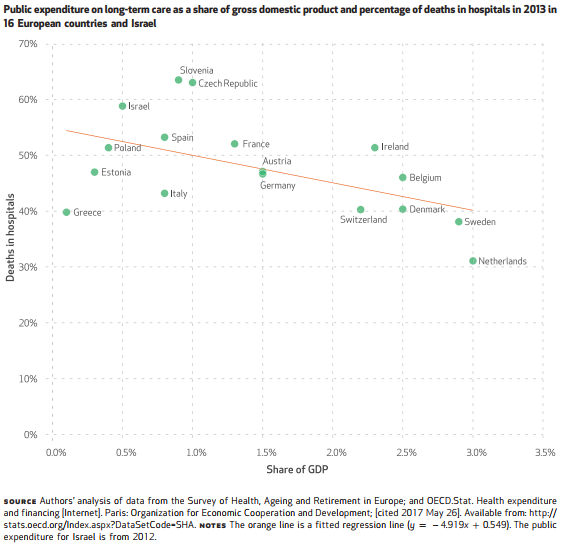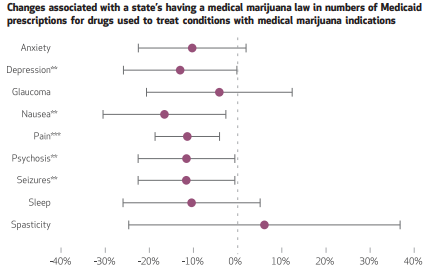In the U.S., we do a lousy job of paying for long-term care. We don’t help people cover the costs of nursing homes or home-health aids when they have chronic, life-threatening illnesses. As a result, more Americans die in the hospital than they would if we covered long-term care more generously. At least that’s the conclusion suggested by a recent study of more than two dozen European countries. As shown below, the researchers found that the more countries spent on long-term care (as a percent of their GDP—the x-axis), the fewer of their residents died in the hospital (shown on the y-axis):

The U.S. needs to find ways to help people cover the cost of long-term care. The quality of their deaths may depend on it.
Your Risk Of Prostate Cancer Just Dropped Precipitously. Here's Why

Most men diagnosed with prostate cancer don’t die of the disease. Between 2011 and 2015, 112.6 per 100,000 men per year were diagnosed with prostate cancer in the U.S., but only 19.5 per 100,000 men per year died of the disease over that same period of time. That is still far too many deaths. But the huge disparity between deaths and diagnoses arises in large part from overdiagnosis of prostate cancer in elderly men, as a consequence of screening tests that find cancers that, if they had never been diagnosed, would not have progressed to life-threatening illnesses.
Fortunately, such overdiagnoses are beginning to decline, because physicians are backing off on screening older men for prostate cancer.
(To read the rest of this article, please visit Forbes.)
The Greediest Companies In American Healthcare Are Not Who You Think

There’s plenty of price gouging in American healthcare.
The pharmaceutical industry has gotten plenty of (well deserved) bad press for its pricing practices. At the extreme are people like “Pharma Bro” (and convicted felon) Martin Shkreli, who hiked the price of an important medication to treat infections in AIDS patients by over 5000%. But high and rising prices are the norm in pharma. New cancer drugs routinely cost more than $100,000 per patient, even when they bring only modest benefits. And some generic medications are going up in price rapidly, 10% or more per year, as the number of generic manufacturers declines.
But it’s not the pharmaceutical industry I’m worried about today.
What about insurance companies? They, too, are routinely criticized for high prices. Premiums continue to rise faster than inflation. And while Americans struggle to find affordable plans, leading insurance company executives report staggeringly high annual incomes. Since passage of the Affordable Care Act, David Cordani, CEO of Cigna, has taken home more than $140 million of compensation. Yet he feels poor compared to Stephen Hemsley, the CEO of UnitedHealthGroup, who has made almost $300 million.
But it’s not insurance companies that are making me anxious right now.
(To read the rest of the article, please visit Forbes.)
The Surprising Truth About The Rising Price Of Generic Medications

In recent years, it feels like we’ve been inundated by stories of greedy pharmaceutical companies jacking up the price of important generic medications. In 2015, “Pharma Bro” Martin Shkreli, recognized that no other generic companies were manufacturing Daraprim, a drug used to treat infections common among people with AIDS. So he raised the price of that generic medication from $13.50 a pill to $750, confident that no competitor was around to cut into his market share. The media had a field day with Shkreli’s story, as well as other notorious examples of generic drug manufacturers raising the price of their products by an astonishing amount; consider the ten-fold increase in the price of generic Digoxin (a heart medicine) and Doxycycline (an antibiotic). In fact, worried about such price gouging, Massachusetts Senator (and presidential candidate) Elizabeth Warren has called for the US government to go into the business of manufacturing generic medications.
Just how greedily have generic manufacturers been gouging the American public of late? The truth is surprising. In the last 10 years, the price of generic medications in the US has actually fallen.
(To read the rest of the article, please visit Forbes).
Want to Reduce Opiate Overdoses? Legalize Medical Marijuana
I have written about medical marijuana before, relaying research findings showing that the legalization of medical marijuana is associated with a reduction in use of pain medications.
Here’s another piece of evidence leading to a similar conclusion, from a study by the research team of Bradford and Bradford out of the University of Georgia. (Athens, Georgia being famous for its music scene, I wonder if Bradford and Bradford have ever formed a band. But I digress.)
The researchers found that in states that legalized medical marijuana, there was a reduction in medication use among Medicaid enrollees, across a wide range of medications. This reduction was especially notable for pain medications, which plummeted in those states:

We have an epidemic of opioid abuse. Record numbers of Americans will die of narcotic overdoses this year. It is time to legalize and strictly regulate the use of medical marijuana. Opiates are known to kill people from overdoses. Pot doesn’t.
Insurers Are Not Paying Enough For HPV Vaccines – And Our Kids Are Paying The Price

The HPV vaccine saves lives. It does so by reducing a person’s chance of being infected by the human papilloma virus, a virus that causes a whole range of cancers including, most importantly, cervical cancer. Vaccinate your teenage daughter against HPV, and you will increase the chance she will live to old age. Simple as that.
Yet currently, the majority of American teenagers, boys and girls, are reaching adulthood without the full protection of the vaccine. Sometimes they don’t get vaccinated because they or their parents are opposed to the vaccine (for reasons that irk me too much to dwell upon right now). To increase vaccination rates, we need to overcome people’s resistance to this vaccine.
But there’s something else that’s preventing kids from getting vaccinated that might even be more maddening than anti-vaxxers– insurance companies aren’t covering the full cost of the vaccine, causing some physicians too, shall we say, less than aggressively promote the intervention. To increase vaccination rates among American children, insurance companies need to reimburse providers more generously for vaccinating their patients.
(To read the rest of the article, please visit Forbes.)
A Surprisingly Easy Way To Become Happier

What makes people happy? A load of studies tell us that human interaction is key to our happiness. But what kind of interactions matter? And does interaction increase everyone’s happiness, or is it something primarily beneficial to extraverts?
A fantastic study set out to answer these questions. In the study, researchers audio-recorded random times in people’s daily lives, and had research assistants figure out how often people were either: (1) alone; (2) engaged in small talk; or (3) engaged in substantive conversation. They also measured people’s life satisfaction.
(To read the rest of this article, please visit Forbes).
Thoughtful Discussion of Trump Administration Drug Pricing Plans

The Trump administration is thinking of requiring pharma companies to include price information in their ads. Here is a quick thoughtful article exploring a few reasons that information might not work as intended. It includes a summary of some of the things I’ve written about copay assistance programs, that essentially make patients insensitive to the (often extremely) high price of their medications.
A proposal by the Trump administration to address the high prices of drugs by making drugmakers include list price information in direct-to-consumer advertising received renewed attention in Congress this week. But while a recent study indicates that high list prices can indeed diminish interest in a drug, it also indicated that drugmakers can get around that by promising copay assistance and coupons.
On Tuesday, Sen. Chuck Grassley, R-Iowa, advocated inclusion of list prices in the television commercials for drugs. “I am confident in the ability of Americans to use this information to make the best decision for themselves,” he said in remarks in a hearing on drug pricing.
Some experts have already called the wisdom of that proposal into question, saying that it is more likely to cause confusion, misinformation and oversimplification of how drug pricing actually works than to create consumers well-informed and equipped to make smart decisions about their therapy.
But the new study adds an additional wrinkle, indicating that information about financial assistance may undercut the sticker shock from high prices. The study, published as a research letter last week in the Journal of the American Medical Association, was conducted by researchers at Johns Hopkins University, Clemson University and Brigham Young University.
To read the rest of this piece, please visit MedCityNews.
Colon Cancer Screening Controversy. Here's What All The Debate Is About.

How Great HIV Medicines Are Now (In Two Pictures)

In 1991, I remember where I was walking when I learned that Magic Johnson was HIV positive. I shuffled along in a daze, distraught at the thought of such a young and magnificent man facing imminent death. Back then, you see, an HIV diagnosis was practically a death sentence. Of course, Magic Johnson is still alive. But he was one of the minority of people in 1991 who were able to get the virus under control with the medications of that time. For the vast majority of people, the medications weren’t effective at suppressing the virus. Their days were numbered.
Boy have times changed! Medications are so good today that the majority of people under treatment for HIV have no virus detectable in their blood.
(To read the rest of this article, please visit Forbes).
